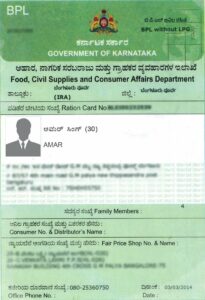You can apply for a PAN Number either online or in person.
Applying for a PAN Number (Online)
The process is as follows:
Step 1: You may visit the Income Tax Department (ITD) website here to find out whether you already have a PAN Number or not.
Step 2: An applicant can make an online application for a PAN Number through the National Securities Depository Limited (NSDL) website.
Step 3: For submitting applications for new PAN Number, Indian citizens including those living outside India have to select Form 49A 1 on the NSDL website here. Download the form here. Read detailed instructions for filling Form 49A here. A token number will be generated and sent to your email address, that you can use to save the entered details, and edit later.
Step 4: The applicant should ensure that the necessary supporting documents are submitted along with the application. It is necessary to submit one Proof of Identity (PoI) bearing the name of the applicant, one Proof of Address (PoA), and Proof of date of birth. 2 Please note that it is mandatory to quote Aadhaar/Aadhaar Enrolment ID for making an application for PAN Number. 3 View the consolidated list of documents here. The Name mentioned in the Application Form and the Name in the PoI/PoA should match exactly.
If the applicant is a minor (i.e. below 18 years of age at the time of application), any of the documents of any of the parents/ guardian of such minor shall be deemed to be the proof of identity and address of the applicant.
Step 5: The applicant can fill in the online application for a PAN Number by:
- i) Submission of physical form and documents after online data entry
- ii) Aadhaar based e-KYC
iii) Scanned based – Aadhaar based e-Sign
- iv) Scanned based – Digital Signature Certificate (DSC)
For more information, read here.
Step 6: The processing fee charges for applying for PAN Number vary depending on whether or not you require a physical PAN Card. Find your applicable fee details here. 4 Payment of online application fee can be made through credit/debit card, or net-banking. You can check the status of your financial transaction for online application here.
Step 7: On successful payment, an acknowledgement slip will be generated, which you will also receive via email. You are required to save and print it in order to send it to the NSDL. You can regenerate your acknowledgement receipt here (application after July 16, 2016), or here (application on or before July 15, 2016).
Step 8: In your online application for PAN Number, you can choose a Physical mode of submission where you send physical documents to the NSDL address. For Paperless modes of application such as e-KYC, e-Sign based or DSC based application, there is no need to send physical documents to NSDL. For more information, read here.
Step 9: Applicants may track the status of their PAN Number application using the unique Acknowledgement Number here. Alternatively, you may send an SMS – NSDLPAN <space> 15-digit Acknowledgement number to 57575.
Step 10: A new PAN Number is allotted by the ITD and a printed PAN Card along with an allotment letter is dispatched by the NSDL, to the applicant. Normally, around 2 weeks are required to complete the process. You can also download your e-PAN Card here.
You can also apply for a PAN Number if you are a corporate applicant like a company, or a foreign citizen.
If you require any additional help and support, please see here.
Applying for a PAN Number (in Person)
Step 1: Submit a physical application for a PAN Number to any TIN Facilitation Centre (TIN-FC) or PAN Centre of NSDL. Locate TIN-FCs cum PAN Centres near you here. You can also locate the nearest exclusive PAN Centre here.
Step 2: Fill in Form 49A, which can be downloaded here. Ensure that the necessary supporting documents are submitted along with the application for PAN Number. Refer to Step 4 given above in the Online application section for further details.
Step 3: Your fee details 5 vary depending on whether you require a physical PAN Card.
If a physical PAN Card is required to be dispatched to an Indian address, your fees (inclusive of applicable taxes) is Rs. 107. If a physical PAN Card is required to be dispatched to an foreign address, your fees (inclusive of applicable taxes) is Rs. 1,017.
The fees (inclusive of applicable taxes) for an e-PAN Card which is dispatched to your email ID is Rs. 72.
Step 4: Collect your acknowledgement slip.
Step 5: Track the status of your PAN Number application using the unique Acknowledgement Number here. Refer to Step 9 given above in the Online application section for further details.
Step 6: A printed PAN Card along with an allotment letter is dispatched by the NSDL, to the applicant. Normally, around 2 weeks are required to complete the process.
If you require any additional help and support, please see here.
Read this Government resource for more information on this
- Rule 114(1), Income-tax Rules, 1962.[↩]
- Rule 114(4), Income-tax Rules, 1962.[↩]
- Section 139AA, Income-tax Act, 1961 inserted by the Finance Act, 2017.[↩]
- Tax Information Network of Income Tax Department, PAN, https://www.tin-nsdl.com/services/pan/form49A.html[↩]
- Tax Information Network of Income Tax Department, PAN, FAQ’s, https://www.tin-nsdl.com/faqs/pan/faq-pan-procedure.html[↩]
